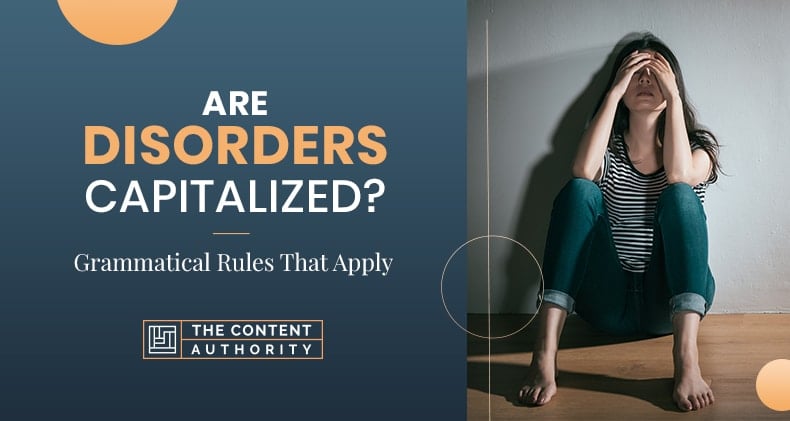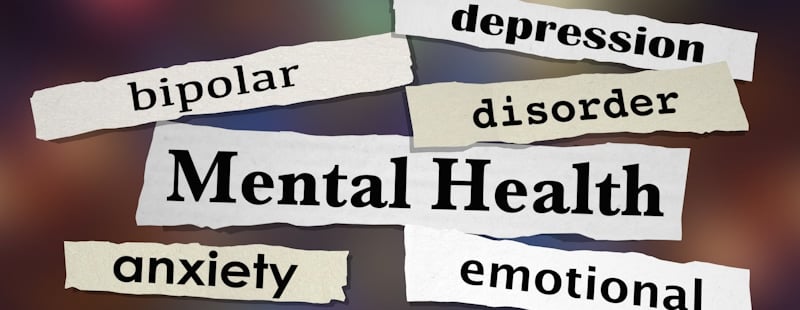It is likely you have had to write something related to mental illness at some point in your life. So, as with every other terminology you might wonder what is the correct way to capitalize mental health disorders in writing.
The general rule is that mental health disorders are not capitalized unless they are named after the person who discovered them. For the most part traditional capitalization applies, such as capitalizing them if they are at the beginning of a sentence.
It is not unusual to doubt when a word should be capitalized, given the fact that usually, when we use it, we are referring to certain conditions. It is always crucial to check certain word’s spelling when working or writing about these topics.
The concern with correct spelling of mental health disorders picked up even more after the first publication of the DSM (Diagnostic and Statistical Manual of Mental Disorders). DSM is the handbook used by professionals in the United States and much of the world as the official guide to diagnosing mental disorders. DSM contains descriptions, symptoms, and other criteria for diagnosing mental disorders. There have been five publications of the DSM, the latest one being DSM-5 published in 2013.
Capitalization of Disorders When Written Individually
There is an insurmountable amount of known disorders. Let’s categorize and capitalize a few:
Mood disorders:
- Persistent depressive disorder
- Bipolar disorder
- Premenstrual dysphoric disorder
- Major depression
- Postpartum depression
Anxiety disorders
- Generalized anxiety disorder
- Obsessive-compulsive disorder
- Panic disorders
- Phobias
- Agoraphobia
- Social anxiety disorder
Eating disorders
- Anorexia nervosa
- Bulimia
- Binge eating
Trauma-related disorders
- Post-traumatic stress disorder
- Acute stress disorder
Impulse control disorders
- Kleptomania
- Pyromania
- Intermittent explosive disorder
Psychotic disorders
- Schizophrenia
- Schizoaffective disorder
- Brief psychotic disorder
Personality disorders
- Narcissistic personality disorder
- Borderline personality disorder
- Avoidant personality disorder
- Paranoid personality disorder
- Dependent personality disorder
Synonyms And Disorders
As is to be expected, mental health disorders don’t have an equivalent most times but we can find a list of synonyms related to mental illness as a whole malady. Here are some of them:
- Madness
- Lunacy
- Insanity
- Neurosis
- Derangement
- Loss of mind
- Craziness
- Delusion
- Troubled mind
- Sick minded
- Disturb mind
- Psychosis
Examples Sentence With Disorders That Must Be Capitalized:
- Her child was born with Down syndrome.
- There are many strange mental illnesses a person could have but Munchausen syndrome is one of the most peculiars in my opinion.
- Asperger’s syndrome affects less than 2% of the world wide population.
- His grandmother was diagnosed with Alzheimer’s.
- I once met a person with Tourette’s syndrome and it was shocking the amount of ticks this person had.
Example Sentence With Disorders That Do Not Need To Be Capitalized:
- Susan suffered from generalized anxiety and some days she couldn’t get out of the house.
- Mike’s depression had gone on for so long that he had given up and was considering taking his own life.
- She was a special needs teacher and mainly worked with children who had visual perceptual/visual motor deficit.
- I think dyslexia would be the most difficult disorder for me. I can’t imagine not being able to read, books are one of my favorite things in the world.
- My nephew was diagnosed with an auditory processing disorder.
Disorders FAQ
Are all disorders capitalized?
The answer is no. Diseases are just ordinary words unless they are named after the particular person who discovered them, just like the word “disorder”. Let’s say you want to write a paper on some diseases, you would not have to capitalize spina bifida or osteogenesis imperfecta. However, you would have to partially capitalize Cushing’s disease or Lou Gherig’s disease. Other common names you would have to partially capitalize also include: Asperger’s syndrome, Carrion disease, Parkinson’s disease, and many more.
What are eponymous diseases?
The term eponym is used to name a disease or medical term after a person who either had the disease or first discovered it. Many diseases are called a certain way because they are eponyms.
Is there really a difference between a disease and a disorder?
Yes! A disease is a particular distinctive process in the body with a specific cause and characteristic symptoms, while a disorder is an irregularity, disturbance, or interruption of standard functions.
Where can I seek help if I think I have a mental disorder?
There are many ways and places to seek help. If you believe you are experiencing a crisis, please seek help immediately. You can reach out and talk to a trained professional at 1-800-273-TALK (8255) available through the National Suicide Prevention Lifeline or Text MHA to 741741 to connect with an experienced Crisis Counselor from Crisis Text Line. Call 911 or go to the nearest emergency room.
If you believe you need support but are not in crisis, consider reaching out to a warmline. A warmline is a hotline run by experienced volunteers who have had the experience of needing help themselves, giving them insight into what you may be feeling.
Do We Capitalize The Word “Disorder”?
The word “disorder” should not be capitalized because when used as either a noun or a verb, “disorder” is a common word. Even when an actual name includes this word in it, it should not be capitalized.
The word “disorder” has multiple definitions. From the noun standpoint, a disorder can be a lack of order, a breach of the peace or public order, an abnormal physical or mental condition. And from a verb standpoint, it means to disturb the order of; and disturb the regular or average functions of something.
Etymology Of The Word “Disorder”
The word “disorder” is made up of the root word order and the prefix dis. This is a Latin prefix and means “apart,” “asunder,” or “away,”; and also the root word order, which in itself implies structure, a particular sequence, pattern, or method. So when we join the two parts, we can completely change its root meaning by adding the prefix and making it the opposite.
The earliest known use is the word desordinare, which is in Medieval Latin. After this, it appears again in Old French as desordainer. Later in Middle English as disordeine. It is believed that the word “disorder” has been primarily widespread since the late 1800s when psychology was formalized.
There are specific disorders that were named after the person who observed them first. Here is a guide as to how to go about it:
- Do not capitalize names of syndromes and conditions, but you do have to capitalize the proper words of the person mentioned within the condition’s name:
- diabetes insipidus (common ailment so capitalization is not necessary)
- Down syndrome (Doctor John Langdon Down was the first person to discover common traits in people with Trisomy 21 and was later named after him)
Final Thoughts
It is not uncommon for the average person to believe that disorders and mental illnesses need to be capitalized, given that they are mainly used to name ailments.
Logic pushes us towards believing this is true; however, we must always strive to excel in doing everything the right way; this means that to properly follow grammar rules only those disorders that are named after who discovered them will be capitalized. All others will be taken as regular nouns and will only be capitalized when used at the beginning of a sentence.
Even when they don’t realize it, most people have a “knack” for knowing when something feels grammatically incorrect because what they teach us in grade school stays with us for life. Other people say it is instinct. No matter what you believe, it is always an excellent idea to check words you may feel unsure of before finishing your work, especially when writing about health related matters.
Shawn Manaher is the founder and CEO of The Content Authority. He’s one part content manager, one part writing ninja organizer, and two parts leader of top content creators. You don’t even want to know what he calls pancakes.



